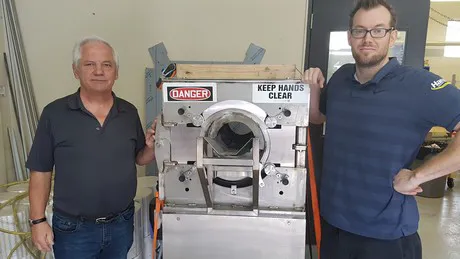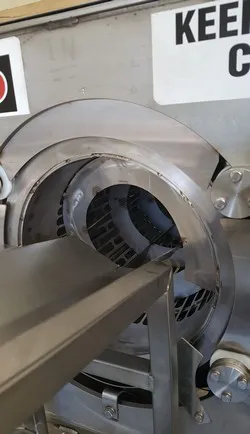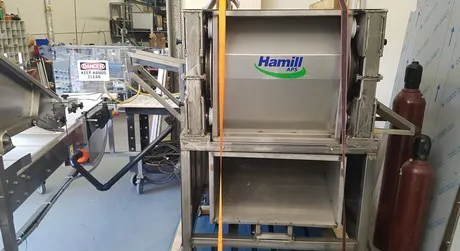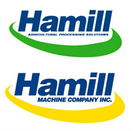As soon as the green rush started, many companies ran into the market buying huge fields and facilities in order to grow as much product as possible. However, rushing to hit the ground running caused a number of issues to them, as the planning required to set up such large-scale agricultural operations is particularly intense. “We have noticed that many people bought many properties to grow cannabis at scale, but they didn’t really take into consideration what comes after the grow: the harvest, that is,” the CEO of Hamill APS, Bob Benner, explains.

“The issue stemmed from the habit of hiring seasonal workers to take care of the harvest. However, cannabis is not like any other agricultural commodity, as the value of the crop is much higher. So, the question I kept asking myself was: ‘why hire 50+ seasonal workers to do a job that an automated machine could do on its own?’.”
Overlooked processes Hamill APS is a trimmer manufacturing company active globally. “We started a few years ago in the horticulture sector,” Bob points out. “When Canada regulated the cannabis industry, we decided to get into the market.” Thanks to the company’s extensive horticultural knowledge, they immediately saw there was a lot of room for improving post-harvesting operations. “The harvesting and post-harvesting processes are oftentimes overlooked,” Bob remarks. “A substantial number of growers either trim by hand, for instance, or they use a machine that wouldn’t allow them to trim as many buds.” This is why Hamill Cannabis Processing Systems Inc. (Hamill CPS) designed the Hamill Counterspin Trimmer, a trimming machine equipped with a series of 12 blades that spin in opposite directions, capable of processing large quantities of buds. “We have been testing this product for more than a year and a half, and now it is ready to go to the market,” Bob says. "We also had to wait for our patent (62952604) to be approved before rolling it out to the public."
Hamill APS is a trimmer manufacturing company active globally. “We started a few years ago in the horticulture sector,” Bob points out. “When Canada regulated the cannabis industry, we decided to get into the market.” Thanks to the company’s extensive horticultural knowledge, they immediately saw there was a lot of room for improving post-harvesting operations. “The harvesting and post-harvesting processes are oftentimes overlooked,” Bob remarks. “A substantial number of growers either trim by hand, for instance, or they use a machine that wouldn’t allow them to trim as many buds.” This is why Hamill Cannabis Processing Systems Inc. (Hamill CPS) designed the Hamill Counterspin Trimmer, a trimming machine equipped with a series of 12 blades that spin in opposite directions, capable of processing large quantities of buds. “We have been testing this product for more than a year and a half, and now it is ready to go to the market,” Bob says. "We also had to wait for our patent (62952604) to be approved before rolling it out to the public."
Easy maintenance
On top of that, the Hamill Counterspin Trimmer is extremely easy to clean. “Keeping the equipment clean when working with cannabis is a very big challenge,” Bob remarks. “Machines can get covered with sticky substances, which ultimately negatively affect the proper functioning of the machine. This is even more relevant when it comes to trimmers.” That is why one of the unique features of the Counterspin Trimmer is the ease with which it can be cleaned. “Usually, you have to disassemble the trimming machine if you want to clean it. Our trimmer, on the other hand, can be thoroughly cleaned without the need for disassembling it, thus increasing ease of maintenance."
Another issue that usually occurs during the post-harvesting operation is related to the space where the product needs to be stored. “So, now we have the problem of what to do with this product,” Bob says. “Thus, we have also designed trimming rooms. From these rooms, conveyors move the product around the facility, in order to boost operational efficiency.”
Safety above all
Now that also the cannabis industry must comply with social distancing measures due to the Coronavirus outbreak, Bob takes care to point out that the Hamill Counterspin Trimmer is absolutely safe. “People working with this are the proper distance from each other. To use a Canadian measure unit: people are one hockey stick away from each other!”

“Jokes aside, we have always made automated equipment that does not need people to be in close contact. At the same time, greenhouses are very clean environments, as you cannot allow any pathogen outbreaks in there that would ruin the crop. This is even more important when it comes to cannabis operations, as the value of the crop is very high, plus the regulations in effect demand growers to be extremely clean and efficient.”
For more information:
Hamill Agricultural Processing Solutions
4727 Kent Ave.
Niagara Falls, ON
L2H 1J3
Shop: 90-354-2922
Fax: 905-354-8262
hamillaps.com
